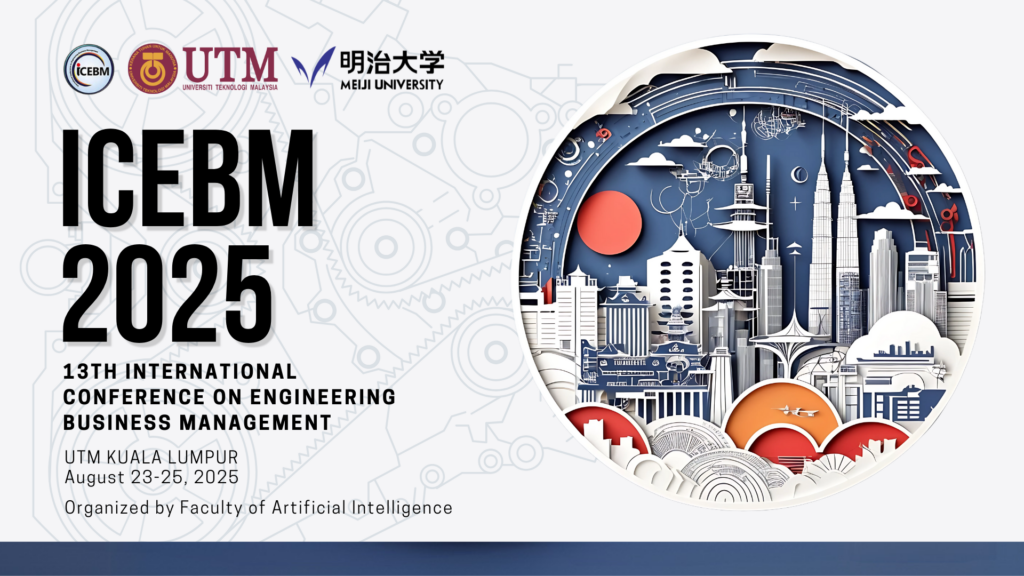
KEYNOTES

Professor, Dr. Hajime Ushimaru
Graduate School of Business Administration (GSBA)
Meiji University, Tokyo, Japan
Title: Toward an AI-Driven Management Science in Japan: Current Status and Research Potential
In recent years, leading Japanese companies have rapidly expanded their application of artificial intelligence (AI) across a broad spectrum of domains, including business process automation, people analytics in human resource management, customer behavior analysis and personalization in marketing, as well as planning and content creation support using generative AI. While small and medium-sized enterprises have generally lagged in adoption, several startups have positioned generative AI as the core of their business models.
In contrast, the use of AI in academic research within the field of business administration remains limited in Japan. This is largely due to challenges such as insufficient technical expertise, the complexity of processing unstructured data (e.g., text and images), and restricted access to proprietary corporate datasets. Furthermore, much of the existing literature focuses on the implications of AI for business management, rather than leveraging AI as a methodological tool in empirical research.
Against this backdrop, this presentation introduces the first in a series of empirical studies by Ushimaru, employing the BERT natural language processing model. The study investigates how management control systems (MCS) influence the formation of an inclusive climate, an essential factor in effective diversity management. Using corporate diversity-related documents from 284 companies recognized for their diversity initiatives, BERT was used to extract and quantify semantic variables. Subsequent analyses, including ANOVA and hierarchical multiple regression, revealed that while Japanese firms tend to emphasize boundary systems within their MCS, such systems negatively impact inclusive climate. In contrast, beliefs and interactive control systems were found to have a positive effect.
Although the integration of AI in corporate practice continues to advance, its incorporation into management studies remains underdeveloped. Nevertheless, recent shifts—such as the inclusion of AI and data science in management education curricula, and policy initiatives from the Science Council of Japan and the Ministry of Education, Culture, Sports, Science and Technology—suggest that AI-driven research in the field of management will likely expand in the coming years.

Ir. Ts. Dr. Fazarizul Hashidi Bin Muhamad Pauzi
Prasarana Integrated Development Sdn. Bhd.
Title: Shaping the Future of Public Transport Industries through AI
Artificial Intelligence (AI) plays a critical role in revolutionising urban public transport systems, especially in Malaysia, which is actively driving the digital and sustainable cities agenda. The efficiency, adaptability, and user-friendliness of urban public transport systems need to improve, given the increasing demands of urbanisation. AI technology offers enormous potential through applications such as predictive maintenance, dynamic scheduling based on real-time data, and user experience personalisation that can increase passenger satisfaction and loyalty.
With the country’s existing strengths, such as high mobile penetration, an increasingly tech-savvy population, and strong government policy support for digital transformation, this session will highlight Malaysia’s readiness to adopt this AI technology. This study will review global case studies and translate them into strategies tailored to the local context, addressing ethical challenges, retraining the workforce, and designing a system that is inclusive and fair to all segments of society.
A practical and holistic action plan should be developed to support transportation industry professionals, urban planners, and policymakers in strategically integrating technological innovations to enhance the quality of urban public transport services in the era of AI.

Siti Atmamimah binti Ahmad Tajuddin,
Chief Executive Officer,
Ideasparq Robotics Sdn. Bhd.
Title : Gap Implementation of Artificial Intelligence (AI) in Malaysian SME: A Mobile Robot Industry Perspective.
Ideasparq Robotics Sdn Bhd launched its first Automated Guided Vehicles (AGV) in 2015. Originally the AGV were developed to address internal transport challenges within its parent company, Autokeen Sdn Bhd, which is a manufacturer of welding and stamping components for major automotive assemblers in Malaysia. The implementation benefited significantly in supply efficiency, space optimization, and workplace safety. The successes have attracted attention from external parties, leading to the commercialisation of the technology. As a result, Ideasparq Robotics evolved into an independent entity, focusing on research and development, assembly, and marketing of mobile robotic solutions.
In recent years, the company has successfully developed mobile robots with both line-guided and autonomous navigation technologies using LiDAR and camera-based systems. These technologies have enabled to have diverse range of mobile robotic platforms. These include indoor line-following AGVs with various load capacities, autonomous floor-cleaning robots, and GPS-navigated outdoor lawn mowers.
Globally, mobile robots are becoming a cornerstone of modern manufacturing operations. Their roles have expanded beyond logistics to include integration with advanced communication systems and artificial intelligence (AI) technologies. AI enhances operations by enabling virtual assistance, real-time data access, 24/7 operations, error reduction, redundancy elimination, and seamless data sharing across different operational units.
Despite these advancements and ongoing government support, the adoption of AI-driven robotics among Malaysian SMEs has faced notable resistance in Malaysia. Various factors contribute to this hesitation, and overcoming them requires a concerted and collaborative effort from multiple stakeholders.
In this presentation, we share our observations on the challenges of promoting AI adoption among Malaysian SMEs. While our insights are drawn from our experience in mobile robotics, the findings are broadly applicable to AI adoption across other domains as well.
